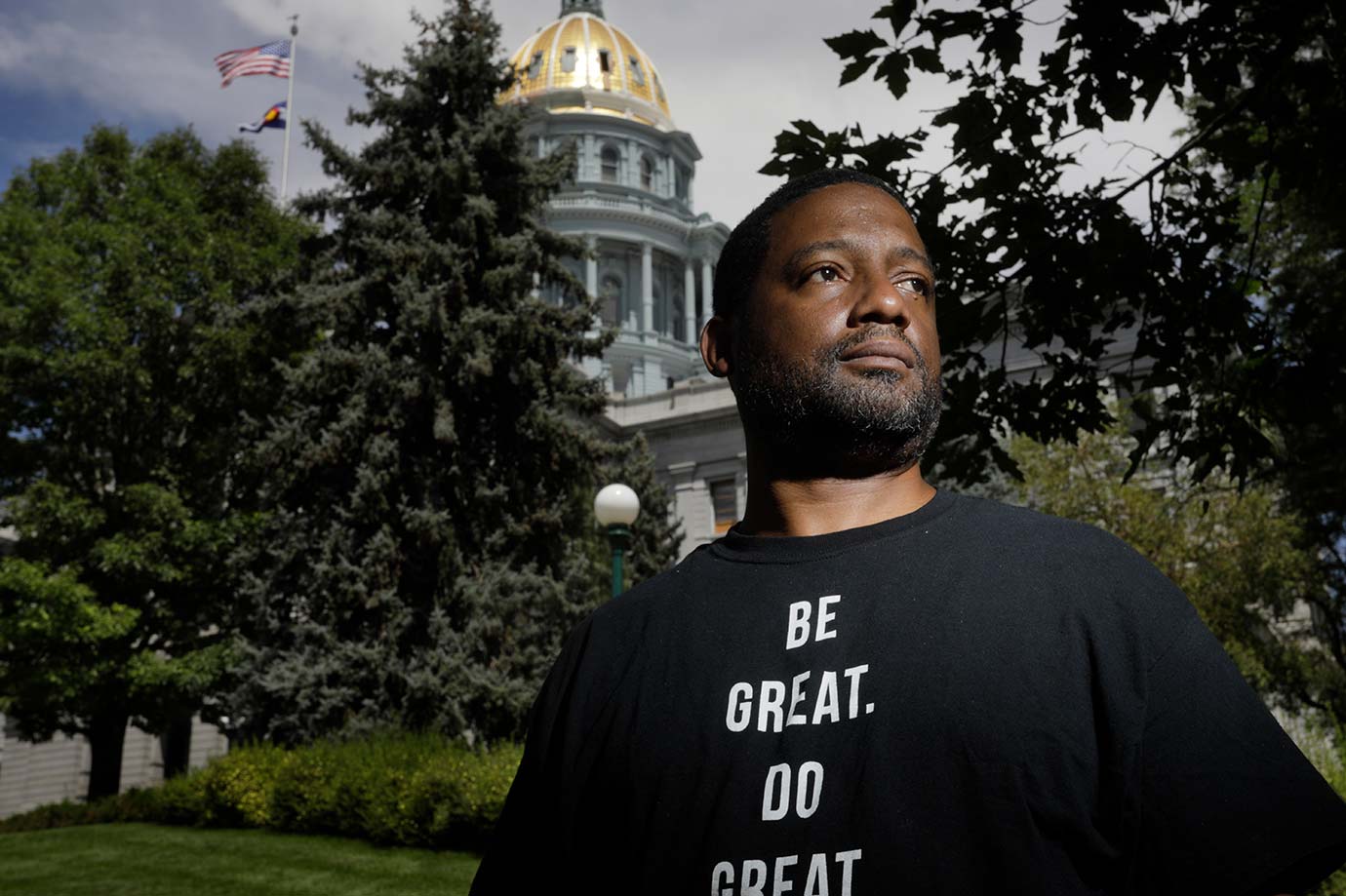In his 20s and 30s, Jonathan McMillan got used to the career-killing question and check box at the top of most job applications: Have you ever been convicted of a crime?
As a former gang member who had been imprisoned and then released on probation, and then been jailed for violating that probation, McMillan’s first few years applying for jobs post-release made him accustomed to the frustrations of “the box.”
But after McMillan had straightened out his life, and held positions with the Denver Department of Safety and later as a Denver City Council community affairs liaison (he now serves on an advisory board for the city’s district attorney), he was surprised to see the box still carried a sting. He’d bought a car and wanted to supplement his steady job with some part-time work over holiday periods in package delivery or rides-on-demand.
And there, on the first screen of the tech-savvy online applications for such positions, was the criminal background question. Click “yes,” and it was an immediate re-direct to a statement that meant “goodbye and good luck.”
“I’m just one of millions of stories,” said McMillan, now 46, and an advocate of this year’s successful effort at the state legislature to “ban the box” from Colorado employment applications. McMillan, who is African American, said you can multiply his challenges over and over when calculating the inequity of employment hurdles based on experience inside the criminal justice system.
“When you look at Colorado’s population, and Black people in particular—but look at Brown, too—a disproportionate amount of people are caught up in the criminal justice system,” McMillan said.
The issue isn’t just employment, McMillan added: “It gets into the achievement gap in education, the percentage of homeless people in Denver. There’s a lot of work to be done in order to achieve equity in all the major systems of society here, and nationwide. I don’t know if ‘ban the box’ is going to make a big dent in the disproportionality of hiring practices, but at least it’s a start.”
After consecutive years of failed attempts, the 2019 legislature finally accepted advocates’ calls for the ban, which still allows employers to inquire about a candidate’s brushes with the law but only after the initial screening is done. A coalition of nonprofits, social services groups and legal experts had long called the checkbox a form of employment discrimination, and a primary cause of recidivism and prevention of upward mobility, especially in communities of color.
There are more than 1.8 million Coloradans in the state criminal record database, according to the Colorado Center on Law & Policy (CCLP), a Colorado Trust Health Equity Advocacy grantee and one of the prime backers of ban-the-box efforts. (The overall state population is 5.7 million.) A recent ACLU Smart Justice report noted that while African Americans made up 4 percent of the Colorado population as of 2017, they comprised 18 percent of inmates. Latino inmates were similarly overrepresented, making up 19 percent of state population but 32 percent of those behind bars.
According to the same ACLU report, in 2014 Colorado had the ninth highest imprisonment rate in the nation for African Americans, and the fourth highest rate for Latinos, per 100,000 adults.
Discriminatory laws and unequal enforcement and sentencing contribute to these disparities. For example, for years, federal sentencing requirements for possessing crack cocaine were far more severe than sentencing for cocaine in its powdered form.
The National Employment Law Project put the numbers even more starkly, estimating that 70 million Americans have some sort of criminal record, and noting that men with criminal records accounted for an astonishing 34 percent of the working-age unemployed in a 2015 poll—many times higher than the overall national unemployment rate. A Brookings Institution report on national incarceration and recidivism inequities found that only 55 percent of former prisoners had reportable income a year after release, and that incarceration rates in the most troubled zip codes reflected significant poverty and racial disparities.
Finding work, finding housing and getting accepted into higher education or vocational training courses are all crucial pieces of lowering recidivism and breaking one of the most vicious cycles among social determinants of health, said Carol Peeples, founder of the Denver nonprofit Remerg. Remerg, which aims to reduce recidivism by providing re-entry resources to people in the criminal justice system, tries to “connect people to information they need to start over,” Peeples said.
“Because we have this condition of incarceration in this country, we have so many people with criminal histories,” Peeples said. “Employment is imperative for people to start over. Everybody has to have that first job, so we’re trying to reduce that barrier.”
And for a long time, the infamous box was the biggest barrier of them all.
“When some of our folks see that box, they just stop filling out the application. It’s a deterrent right from the beginning,” said Tammy Bellofatto, director of vocation services at the Colorado Coalition for the Homeless and the Homeless Veterans Reintegration Program.
“A lot of times an employer doesn’t want to deal with someone who is justice-involved,” she added. “When employers get as many online applications as they do these days, they can screen them before they even do phone interviews. It’s easy to set [checked boxes] aside and say, ‘let’s call those other people.’”
Employers may fear an employee with a criminal past might repeat the behavior, or they may just be avoiding the accommodations that come with some ex-convicts, Bellofatto noted: Hiring a person on parole or probation can mean working around intermittent requirements like a regular parole officer check-in or a drug test.
Bellofatto would know. She was pardoned by Gov. John Hickenlooper in December 2018 for felonies involving theft and controlled substances more than 10 years ago. The homeless coalition gave her a chance when she got her current job, but she said she’d never forget a previous application for a position at another organization. Bellofatto checked the box and gave them her history in a preliminary interview; the employer seemed excited about her prospects. But Bellofatto’s explanation never made it to the HR department.
“Then they ran the background check. The next call I got was a message saying, ‘We will not be moving forward [with you], and you know why.’ That was devastating,” she said.
Colorado’s ban-the-box legislation takes effect in September for businesses with more than 11 employees, and two years later for smaller employers. The bill made Colorado the 12th state to change the longtime employment practice. The ban-the-box effort was extended this year in other legislation, including:
- College applications. Senate Bill 19-170 directed Colorado’s public colleges and universities to stop asking criminal history or academic discipline record questions on initial applications. It did include exemptions allowing higher-education institutions to ask about certain violent crimes including sexual assault, stalking and domestic violence.
- Rental applications. House Bill 19-1106, which included new restrictions on what application fees landlords can charge and how they refund them, also included provisions limiting questions about criminal history to the previous five years, and credit or rental history to the previous seven years. The new provision included exemptions allowing landlords to learn more about certain convictions, such as drug manufacturing or sex offenses.
Opponents of the employment, housing and student “boxes” had worked on the issue for years, introducing bills at multiple legislative sessions and eventually running into too much opposition from business interests who did not want new restrictions on their practices. Some trade groups also feared the bans opened a path to expensive lawsuits from applicants who were rejected for legitimate reasons. Negotiators for advocacy coalitions continually revised the proposals to accommodate some of those concerns, including adding more exemptions for certain types of offenses, discouraging litigation, and delaying the box ban for smaller employers.
Business groups have also noted the pro-reform advocacy of prominent conservative funder Koch Industries, which announced it was banning the box for its 60,000 jobs in 2015 and launched a campaign encouraging other major employers to do the same.
By this year, the Colorado Chamber of Commerce had dropped opposition, while the legislature’s Democratic majority in both chambers pushed more reform bills through previously sticky committees.
Key for the Chamber of Commerce was that the employment box ban still allows for background checks to be conducted once an applicant reaches later stages of the process, said Loren Furman, senior vice president for state and federal relations. “It’s something we appreciate from the sponsors of the bill, they looked at what happened in past legislatures and took it into consideration,” she said. “I wish that other legislators would do that more often.”
Advocates who have been researching and creating policy on the social determinants of health see the ban-the-box success as part of an overall movement in Colorado and other states to tackle systemic roadblocks to those struggling to improve their lives. Coalitions are bolstering tenant rights in eviction cases, rolling back cash bail (which often keeps people behind bars before even having their cases heard) in minor offenses, wiping out past convictions for now-legal marijuana, and striking down “debtors’ prisons” where judges jail people for unpaid fines.
These issues “can’t be examined in a silo,” said Jack Regenbogen, a CCLP attorney specializing in family economic security and policy issues. An example: A person experiencing homelessness might get a criminal record for violating Denver’s camping ban. The criminal conviction makes it harder to find permanent housing. No permanent address and a criminal record makes it harder to land a job. Renting a cheaper place through Craigslist or sleeping on the street can mean no formal receipt in order to apply for public rent assistance.
“It’s interesting how one issue can cascade and have a ripple effect,” Regenbogen said.
Peter Dybing has felt those cascading effects for most of his life, both from personal mistakes and through the experiences of clients of the Colorado Coalition for the Homeless, where he is security director.
Dybing said he’s “passionate” about banning the box because he was arrested for robbery as a teenager and served time in prison. He said he was lucky to have come from a relatively privileged family he could fall back on, and that helped him get a job after release.
But the record will always haunt him: When he wanted to switch careers to become a firefighter, he searched through 300 different department applications to find one that only asked for a criminal record for the previous seven years, so that he could answer honestly.
He spent 23 years as a firefighter before becoming an advocate for people experiencing homelessness, a significant number of whom have some criminal justice involvement in their lifetime.
“I look at my brothers and sisters and realize it’s a lifelong scarlet letter, and a tragedy for people who are being oppressed by a system that has no forgiveness,” Dybing said. Dybing recalls filling out a parent volunteer application at his kids’ school, and the criminal history box barred him from driving on field trips.
“I’ve been out of prison more than 30 years and the trauma doesn’t go away,” he said. After three years of advocacy, Dybing said he’s gratified to see the ban passed and new opportunities opening up for people trying to change their lives.
Peeples, with the assistance organization Remerg, said Colorado employers shouldn’t look at the new reality as a restriction or impediment to their work. With the state unemployment rate at historic lows and businesses having to raise their starting wages significantly to attract workers, opening up a new group of applicants to consider will be a boon, she said.
The box “doesn’t even make sense for employers anymore,” Peeples said. “They [were] losing out on really good applicants.”




